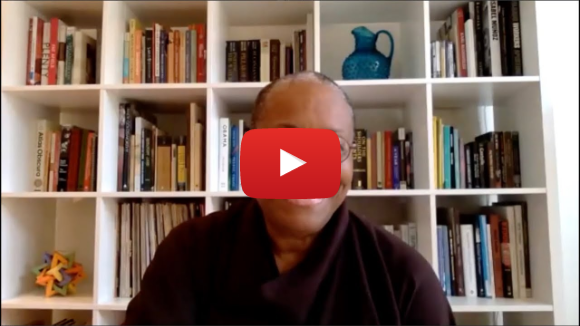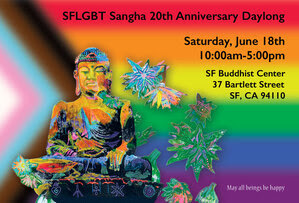Think
of the breath as a whole-body process. It’s not just the air coming in
and out of the lungs. It’s the flow of energy throughout the body, part
of which is related to the flow of the blood and to the sense of
aliveness in your nerves. Try to be sensitive to the whole body as you
breathe in and breathe out.
Thanissaro Bhikkhu, “Less Is More”
CLICK HERE TO READ THE FULL ARTICLE
A personal blog by a graying (mostly Anglo with light African-American roots) gay left leaning liberal progressive married college-educated Buddhist Baha'i BBC/NPR-listening Professor Emeritus now following the Dharma in Minas Gerais, Brasil.
Monday, June 13, 2022
Via Daily Dharma: Breathe with the Whole Body
Via White Crane Institute // RICHARD BARNFIELD
This Day in Gay History
June 13
RICHARD BARNFIELD,
English poet, born (d: 1620); There are, as everyone knows, certain
inseparable teams: Gilbert & Sullivan, Cheech and Chong, bagels and
lox, ham and eggs, Sodom and Gomorrah. In classical mythology, as in
ballet, there are Daphnis and Chloë, the Greek shepherd and his lady
love – Daphnis and Chloë, as inseparable as yin and yang, gin and tonic,
Ron and Nancy.
Not in Richard Barnfield, however. His Affectionate Shepherd
(1594) scandalized Renaissance England by describing in florid detail
the love of Daphnis and Ganymede, just a couple of guys, foolin’ around.
What the fuss was all about is difficult to say since, in the absence
of Chloë, Daphnis never exercised his shepherdly option of making it
with his favorite sheep, choosing a boy instead. “If it be a sin to love
a lovely lad,” wrote Barnfield, “Oh, then sin I.” He was not quite
twenty-one when he wrote the poem. His obscure though close relationship
with Shakespeare has long made him interesting to students.
Richard Barnfield was born in Staffordshire, England. In his youth, he was deeply influenced by Virgil’s work and the 1591 publication of Sir Philip Sidney’s Astrophel and Stella, which popularized the sonnet sequence. Best known for his poem “As it fell upon a day,” Barnfield is the only Elizabethan male poet apart from Shakespeare—whom he admired—to address love poems to a man.
Little is known about Barnfield’s life and career, but it is thought that his maternal aunt raised him and his sister after his mother died during childbirth. In 1592 he graduated from Brasenose College, Oxford. At the age of twenty-one he published his first two books, The Affectionate Shepherd (1594) and Cynthia (1595), both addressed to “Ganymede.” Originally published anonymously, The Affectionate Shepherd expands upon Virgil’s second eclogue, and its homoerotic themes made Barnfield’s poems controversial for his time.
-------
Today's Gay Wisdom
Sonnet 16
By Richard Barnfield
Long have I long’d to see my love again,
Still have I wished, but never could obtain it;
Rather than all the world (if I might gain it)
Would I desire my love’s sweet precious gain.
Yet in my soul I see him every day,
See him, and see his still stern countenance,
But (ah) what is of long continuance,
Where majesty and beauty bears the sway?
Sometimes, when I imagine that I see him,
(As love is full of foolish fantasies)
Weening to kiss his lips, as my love’s fees,
I feel but air: nothing but air to bee him.
Thus with Ixion, kiss I clouds in vain:
Thus with Ixion, feel I endless pain.
Sonnet 17
By Richard Barnfield
Cherry-lipped Adonis in his snowy shape,
Might not compare with his pure ivory white,
On whose faire front a poet’s pen may write,
Whose roseate red excels the crimson grape,
His love-enticing delicate soft limbs,
Are rarely framed to entrap poor gazing eyes:
His cheeks, the lily and carnation dyes,
With lovely tincture which Apollo’s dims.
His lips ripe strawberries in nectar wet,
His mouth a Hive, his tongue a honeycomb,
Where Muses (like bees) make their mansion.
His teeth pure pearl in blushing coral set.
Oh how can such a body sin-procuring,
Be slow to love, and quick to hate, enduring?
|8|O|8|O|8|O|8|O|8|O|8|O|8|O|8
Gay Wisdom for Daily Living from White Crane Institute
"With the increasing commodification of gay news, views, and culture by powerful corporate interests, having a strong independent voice in our community is all the more important. White Crane is one of the last brave standouts in this bland new world... a triumph over the looming mediocrity of the mainstream Gay world." - Mark Thompson
Exploring Gay Wisdom & Culture since 1989!
www.whitecraneinstitute.org
|8|O|8|O|8|O|8|O|8|O|8|O|8|O|8
Sunday, June 12, 2022
Via ARISE Sangha
ARISE Sangha |
Transforming the World's Divisions Through Love and Understanding |
 |
One branch of the International Plum Village Community tree that has sprung from Thay’s vision of inclusion is the ARISE (Awakening through Race, Intersectionality, and Social Equity) Sangha. ARISE works to address and heal wounds of racial injustice and social inequity, bridging mindfulness and social action in practice communities and in the larger world. ARISE offers special online gatherings, webinars, a newsletter, Dharma teachings, articles (like this one on Juneteenth),
and opportunities for Engaged Buddhism, in-depth conversations, and
mindfulness practices that uphold and honor historically
underrepresented groups within the global Sangha. |
| Learn More About ARISE |
Via The Raft // Honoring Juneteenth
“I am a drop in the ocean, but I'm also the ocean. I'm a drop in America, but I'm also America. And as I transform myself and heal and take care of myself, I'm very conscious that I'm healing and transforming and taking care of America.”
Larry Ward, author of America's Racial Karma: An Invitation to Heal
| ||
Via Dhamma Wheel | Right Mindfulness and Concentration: Establishing Mindfulness of Mental Objects and the Fourth Jhāna
Establishing Mindfulness of Mental Objects
|
|
|
|
|
|
|
|
|
|
|
One week from today: Establishing Mindfulness of Body and Abiding in the First Jhāna
Share your thoughts and join the conversation on social media
#DhammaWheel
Questions? Visit the Dhamma Wheel orientation page.
Via Daily Dharma: Practice Again and Again
Practice
is an act of vision, of faith, and of desire. It means performing
something over and over again, in the face of obstacles and
disappointments, to accomplish the goal.
Diane Musho Hamilton, “Practice Is the Way”
CLICK HERE TO READ THE FULL ARTICLE
Via Ram Dass - Love Serve Remember Foundation // Words of Wisdom - June 12, 2022 💌
So if you keep your heart open with love towards all people, even though you might say to somebody, ‘That’s wrong, and I’m going to stop you from doing it,’ do it without closing your heart. At least you are offering to all human beings at all times a heart-to-heart resuscitation; you’re offering something of your own being. You’re being with other people in love. And that to me is a gift that you bring, that is the best you can do to heal the situation.
- Ram Dass -
Quoted from the Here & Now Podcast Episode 200
Saturday, June 11, 2022
GBF retreat with Rene Rivera, July 30th 10 am to 3 pm
Enjoy 700+ free recorded dharma talks at www.gaybuddhist.org
SFLGBT Sangha is celebrating our 20th anniversary with a daylong hybrid event at the SF Buddhist Center!
Please register @
No one will be turned away for lack of funds.
Enjoy 700+ free recorded dharma talks at www.gaybuddhist.org
Via Dhamma Wheel | Right Effort: Maintaining Arisen Healthy States
Maintaining Arisen Healthy States
|
|
|
|
|
|
|
One week from today: Restraining Unarisen Unhealthy States
Share your thoughts and join the conversation on social media
#DhammaWheel
Questions? Visit the Dhamma Wheel orientation page.
Via Daily Dharma: Staying Balanced
Equanimity
acts like the ballast of a ship. Although the ship is blown one way or
the other by the winds of life, it neither sinks nor goes too far
off-course.
Christopher Willard, “How Parents and Children Can Learn Balance and Equanimity from the Eight Worldly Winds”
CLICK HERE TO READ THE FULL ARTICLE
Friday, June 10, 2022
Via Dhamma Wheel | Right Living: Abstaining from Intoxication
Undertaking the Commitment to Abstain from Intoxication
|
|
|
|
|
|
|
One week from today: Abstaining from Harming Living Beings
Share your thoughts and join the conversation on social media
#DhammaWheel
Questions? Visit the Dhamma Wheel orientation page.
Via Daily Dharma: Send Lovingkindness to Oneself
Metta,
or lovingkindness, is first practiced toward oneself, since we often
have difficulty loving others without first loving ourselves. Sitting
quietly, mentally repeat, slowly and steadily, the following or similar
phrases: May I be happy. May I be well. May I be safe. May I be peaceful
and at ease.
Barry Magid, “Five Practices to Change Your Mind”
CLICK HERE TO READ THE FULL ARTICLE








